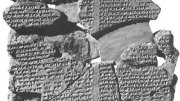Northampton, Massachusetts. Interlink. 2013. ISBN 576
 Hedy Habra’s collection of short stories is divided into four sections. The first two consist of nine delicately observed tales set in Egypt—against a lightly sketched background of Farouk, then Nasser—and Lebanon. Perhaps the most accomplished are “Mariam” and “Distances.” Although devoid of explicit politicking, “Mariam” movingly portrays the life of a domestic drudge in a privileged, westernized family. An illiterate orphan, patronized and taken advantage of, she gives her life and strength to devoted service, including caring for the spoiled children. The unifying themes of the power of storytelling and the mysteries of seashells loosely tie this story to others.
Hedy Habra’s collection of short stories is divided into four sections. The first two consist of nine delicately observed tales set in Egypt—against a lightly sketched background of Farouk, then Nasser—and Lebanon. Perhaps the most accomplished are “Mariam” and “Distances.” Although devoid of explicit politicking, “Mariam” movingly portrays the life of a domestic drudge in a privileged, westernized family. An illiterate orphan, patronized and taken advantage of, she gives her life and strength to devoted service, including caring for the spoiled children. The unifying themes of the power of storytelling and the mysteries of seashells loosely tie this story to others.
“Distances” is a split narrative: a sixteen-year-old Christian girl and a nineteen-year-old Muslim man fall in love during a summer holiday in Lebanon. The latter’s father has no objection to the girl, provided she embraces Islam upon marriage, but points out other, financial, difficulties. However, horrified at the prospect of her daughter’s conversion and her husband’s anger, the girl’s mother insists that the relationship end. Interspersed with the episodes of this sad tale are the “what if?” reminiscences of a middle-class American woman who remembers a close, black, male friend of her college days, an inexplicably broken relationship between a white American man and a Senegalese woman, and the admonitions of her mother (“You can have friends, but keep your distances! Keep your distances!”), words echoed by her allegedly tolerant husband when his son wants a black friend to stay over. “Distances” poignantly embodies insights into the infinite value and precarious fragility of relationships in a harsh world.
The reader, or at least this reader, wishes the stories in the last two sections were less “dreamlike” and more “rooted in time and space, ” to quote the approving assertions of the back-cover blurb. Generally speaking, the further along in the book the story is, the less successful it is. Unconvincing and overwritten, works like “The Fisherman, ” “Noor El Qamar, ” and “Tell Me, Mayra” strain the reader’s patience.
Finally, Interlink has not taken sufficient care with this collection. “[S]he had to improvise daily to maintain Simone and Charles occupied” is not English, “she could no longer bare the thought” is a solecism, and there are eccentricities of capitalization and punctuation throughout.
купить мини-погрузчик Сургут
Source: www.worldliteraturetoday.org
You might also like:



Related posts:























